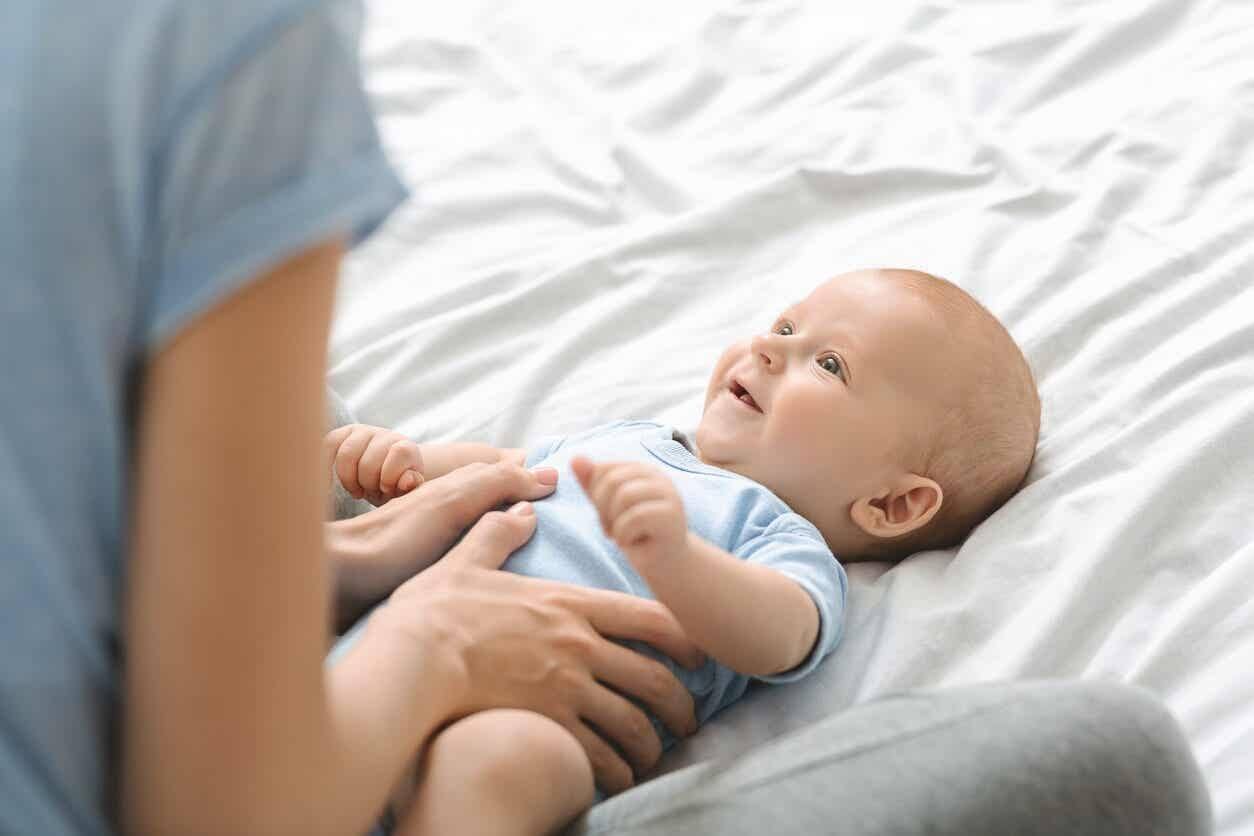Psychological Benefits of Baby Massage

Some mothers find it natural to spend some time each day massaging their baby. Others don’t, and this is completely normal. However, this practice can be very positive for both of you. You may already know that, by doing so, you promote your baby’s blood circulation and strengthen their immune system. You can also relieve stomach discomfort and teething pain. But today, we want to talk about the psychological benefits of baby massage.
The psychological and emotional development of babies in their first months is closely related to the interaction they have with their parents. Massages are a moment of intimacy and connection that can have a very positive impact on the bond between the two. In addition, the mother can also derive great benefits from these moments. Here’s why.
The psychological benefits of baby massage

Massage induces a state of relaxation in the baby
The mother’s womb is a safe, warm, and comfortable space where babies feel protected and in constant contact with their mother. At birth, they arrive in a hostile world, full of bright lights, intense sounds, and in which they begin to feel hunger, fear, or loneliness that they’ve never experienced before.
Massages give them back part of that connection with their mother, allowing them to enjoy her presence, her touch, and her love. And this, added to the caresses of the massage, induces a state of calm and relaxation that’s very beneficial for the child.
It promotes child development
During the massage, babies receive attention, stimulation, and affection from their mothers. This favors the development of a healthy self-esteem. The massage makes them feel important, valuable, and deserving of love and care. It also enhances their attention and their ability to relate to the environment.
Strengthens the attachment bond, one of the psychological benefits of baby massage
The attachment bond defines the type of relationship that’s established on an emotional level between mother and baby. It’s mediated by the interaction between the two, so the more frequent and satisfying it is, the better the quality of the bond.
By massaging your baby, you provide quality care that makes the baby feel cared for and loved. Likewise, skin-to-skin contact helps mother and child experience an increased secretion of oxytocin (the so-called love hormone). This enhances bonding and generates pleasant feelings of well-being.
It allows women to adapt to motherhood
Becoming a mother is a process. It’s not something that’s achieved overnight or learned completely the moment a child is born. A woman needs to adapt to her new role, get to know her little one, and learn to understand them.
One of the psychological benefits of baby massage is that it allows the mother to interact with her child, observe their gestures and reactions, and begin to understand them a little more at a time. It’s a pleasant activity that allows them to get to know each other in depth.
Massage provides a sense of accomplishment
For a mother, her baby is the most important thing. Therefore, she wants to take the best care of her baby. However, she may not always know how to act or what she can do for her baby.

By giving your baby a massage, you’re promoting their physical, cognitive, and emotional development, improving their health, and giving them affection, encouragement, and comfort. Knowing that you’re making such a positive contribution to your little one’s well-being can give you a pleasant sense of accomplishment and increased confidence in your abilities as a mother.
How do you get the psychological benefits of baby massage?
You can start massaging your baby as early as the first month of life and you can choose different times of the day to massage your baby. The important thing is that both you and your little one are receptive at that time. Remember that it’s a time of enjoyment. So, if either of you is too tired, irritable, or nervous, it’ll be better to wait for another time.
The goal isn’t to see it as an obligation, but as a gift to each other and your bond. Most babies enjoy massages after bath time, before bedtime, or upon awakening. However, you can experiment to find out what time suits your needs best.
Some mothers find it natural to spend some time each day massaging their baby. Others don’t, and this is completely normal. However, this practice can be very positive for both of you. You may already know that, by doing so, you promote your baby’s blood circulation and strengthen their immune system. You can also relieve stomach discomfort and teething pain. But today, we want to talk about the psychological benefits of baby massage.
The psychological and emotional development of babies in their first months is closely related to the interaction they have with their parents. Massages are a moment of intimacy and connection that can have a very positive impact on the bond between the two. In addition, the mother can also derive great benefits from these moments. Here’s why.
The psychological benefits of baby massage

Massage induces a state of relaxation in the baby
The mother’s womb is a safe, warm, and comfortable space where babies feel protected and in constant contact with their mother. At birth, they arrive in a hostile world, full of bright lights, intense sounds, and in which they begin to feel hunger, fear, or loneliness that they’ve never experienced before.
Massages give them back part of that connection with their mother, allowing them to enjoy her presence, her touch, and her love. And this, added to the caresses of the massage, induces a state of calm and relaxation that’s very beneficial for the child.
It promotes child development
During the massage, babies receive attention, stimulation, and affection from their mothers. This favors the development of a healthy self-esteem. The massage makes them feel important, valuable, and deserving of love and care. It also enhances their attention and their ability to relate to the environment.
Strengthens the attachment bond, one of the psychological benefits of baby massage
The attachment bond defines the type of relationship that’s established on an emotional level between mother and baby. It’s mediated by the interaction between the two, so the more frequent and satisfying it is, the better the quality of the bond.
By massaging your baby, you provide quality care that makes the baby feel cared for and loved. Likewise, skin-to-skin contact helps mother and child experience an increased secretion of oxytocin (the so-called love hormone). This enhances bonding and generates pleasant feelings of well-being.
It allows women to adapt to motherhood
Becoming a mother is a process. It’s not something that’s achieved overnight or learned completely the moment a child is born. A woman needs to adapt to her new role, get to know her little one, and learn to understand them.
One of the psychological benefits of baby massage is that it allows the mother to interact with her child, observe their gestures and reactions, and begin to understand them a little more at a time. It’s a pleasant activity that allows them to get to know each other in depth.
Massage provides a sense of accomplishment
For a mother, her baby is the most important thing. Therefore, she wants to take the best care of her baby. However, she may not always know how to act or what she can do for her baby.

By giving your baby a massage, you’re promoting their physical, cognitive, and emotional development, improving their health, and giving them affection, encouragement, and comfort. Knowing that you’re making such a positive contribution to your little one’s well-being can give you a pleasant sense of accomplishment and increased confidence in your abilities as a mother.
How do you get the psychological benefits of baby massage?
You can start massaging your baby as early as the first month of life and you can choose different times of the day to massage your baby. The important thing is that both you and your little one are receptive at that time. Remember that it’s a time of enjoyment. So, if either of you is too tired, irritable, or nervous, it’ll be better to wait for another time.
The goal isn’t to see it as an obligation, but as a gift to each other and your bond. Most babies enjoy massages after bath time, before bedtime, or upon awakening. However, you can experiment to find out what time suits your needs best.
All cited sources were thoroughly reviewed by our team to ensure their quality, reliability, currency, and validity. The bibliography of this article was considered reliable and of academic or scientific accuracy.
- Montoya, E. B., & Ferrer, R. R. (2018). Beneficios del masaje infantil en el desarrollo del neonato. Avances en la formación y aplicaciones de la actividad física y el deporte inclusivo, 60. https://books.google.es/books?hl=es&lr=&id=nbxtDwAAQBAJ&oi=fnd&pg=PA60&dq=masajes+bebes+oxitocina&ots=nBUOA8LgjC&sig=x-GFenPMAE5bcF6Hfe3hNLO4prQ#v=onepage&q=masajes%20bebes%20oxitocina&f=false
- Tapia Hoyos, K. L. (2013). Masaje infantil y el desarrollo psicoafectivo del niño (a). https://repositorio.unc.edu.pe/bitstream/handle/UNC/164/T%20302%20T172%202013.pdf?sequence=1&isAllowed=y
This text is provided for informational purposes only and does not replace consultation with a professional. If in doubt, consult your specialist.








